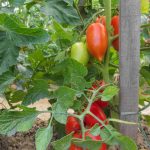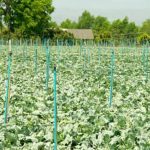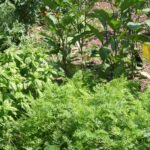Are you interested in starting an organic vegetable garden using heirloom vegetable seeds? Look no further. This article will provide you with a comprehensive guide to getting started with heirloom vegetables and organic gardening. Whether you’re a seasoned gardener or just getting started, this guide will help you understand the importance of heirloom vegetable seeds and how to successfully grow your own organic produce.
Heirloom vegetables are open-pollinated varieties that have been passed down through generations. Unlike hybrid seeds, heirloom seeds have not been genetically modified or altered, making them a popular choice for those looking to preserve traditional plant varieties. In addition to their historical significance, heirloom vegetable seeds are preferred by many organic gardeners due to their ability to adapt to different growing conditions and their rich flavors.
Organic gardening has gained popularity in recent years, as more people become aware of the benefits of growing food without synthetic chemicals. By choosing heirloom vegetable seeds for your garden, you can further enhance the sustainability and health benefits of your organic produce. In the following sections, we will explore the benefits of heirloom vegetable seeds and provide practical tips for starting and maintaining your own organic garden.
The Importance of Organic Gardening
Organic gardening is becoming increasingly popular among home gardeners, and for good reason. By choosing to grow heirloom vegetable seeds through organic gardening practices, you are not only ensuring the health of your family but also promoting environmental sustainability.
Some important reasons to consider organic gardening with heirloom vegetable seeds include:
- Reduced Exposure to Harmful Chemicals: When you choose organic gardening methods, you eliminate the use of synthetic pesticides, herbicides, and fertilizers that can be harmful to both human health and the environment.
- Supporting Biodiversity: Heirloom vegetable seeds are open-pollinated and come from plants that have been passed down through generations. By growing these varieties organically, you are helping to preserve genetic diversity and protect rare plant species. This is essential for maintaining a healthy ecosystem.
- Improved Soil Health: Organic gardening practices such as composting, mulching, and crop rotation can help improve soil structure, fertility, and water retention. This leads to healthier plants with better resistance to pests and diseases.
Furthermore, by choosing organic gardening with heirloom vegetable seeds, you are taking an active role in promoting sustainable agriculture and protecting the future of our food supply.
In today’s world where there is increasing concern about the chemicals used in commercial food production, growing your own vegetables from heirloom seeds using organic methods provides a sense of security and self-sufficiency. It allows you to have full control over what goes into your food and onto your family’s dinner plates.
By making the choice to focus on organic gardening with heirloom vegetable seeds, you are not only improving your own health but also contributing positively to the health of the planet.
Benefits of Heirloom Vegetable Seeds
Heirloom vegetable seeds are an essential component of organic gardening, offering a wide range of benefits for both the environment and the consumer. Unlike hybrid seeds, which are bred for specific traits, heirloom seeds have been passed down through generations and are open-pollinated, meaning they will produce plants with the same characteristics as the parent plant. This diversity in genetic makeup makes heirloom vegetables more resilient to pests and diseases, making them ideal for organic gardening practices.
One of the key benefits of growing heirloom vegetable seeds in your garden is the superior taste and nutritional value they offer. These varieties are often selected for their flavor and quality, rather than their ability to withstand long-distance transportation or extended shelf life. This means that when you grow heirloom vegetables, you can enjoy a wider variety of flavors and textures that may not be available at your local grocery store.
In addition to their superior taste, heirloom vegetable seeds also contribute to preserving biodiversity. Many traditional varieties have been lost due to industrial agriculture focusing on a limited number of high-yield crops. By growing heirloom vegetables in your garden, you are helping to protect these unique varieties from extinction while supporting sustainable farming practices. Whether you’re passionate about preserving heritage plants or simply enjoy delicious homegrown produce, heirloom vegetable seeds are a valuable addition to any organic garden.
| Benefits | Data |
|---|---|
| Resilient to pests and diseases | Check |
| Superior taste and nutritional value | Check |
| Contribution to preserving biodiversity | Check |
How to Choose the Right Heirloom Vegetable Seeds for Your Garden
When it comes to choosing the right heirloom vegetable seeds for your garden, there are a few important factors to consider. Heirloom vegetable seeds organic gardening is not only about growing healthy produce but also about preserving the genetic diversity of our food crops. Here are some key considerations when selecting the best heirloom vegetable seeds for your organic garden.
Consider Your Climate and Growing Conditions
One of the most important factors to consider when choosing heirloom vegetable seeds is your climate and growing conditions. Different heirloom varieties thrive in different climates, so it’s essential to select seeds that are well-suited to your specific region. If you live in a cooler climate, you may want to choose heirloom varieties that are cold-tolerant, while those in warmer climates should look for heat-tolerant options.
Think About Your Garden Space
Another important factor to consider when choosing heirloom vegetable seeds is the amount of space you have available in your garden. Some heirloom vegetables, such as pumpkins or sprawling tomatoes, require a significant amount of space to grow and spread out. If you have limited space, consider choosing compact or bush varieties that are well-suited for container gardening or smaller garden plots.
Choose Seeds From Reputable Sources
When selecting heirloom vegetable seeds for your organic garden, it’s crucial to choose seeds from reputable sources. Look for seed companies or suppliers that specialize in heirloom varieties and prioritize organic and sustainable growing practices. By purchasing from reputable sources, you can ensure that you’re getting high-quality heirloom seeds that will produce healthy and vibrant plants in your garden.
By considering these factors when choosing heirloom vegetable seeds for your garden, you can ensure a successful and bountiful harvest of organic produce while also contributing to the preservation of these precious heritage varieties.
Tips for Starting Heirloom Vegetable Seeds Indoors
When it comes to starting your heirloom vegetable seeds indoors, there are a few key tips to keep in mind. Here are some helpful guidelines to ensure the successful growth of your heirloom vegetable plants:
1. Choose the right containers: Selecting the appropriate containers for starting your heirloom vegetable seeds is crucial. Opt for trays or pots that provide good drainage and are at least 2-3 inches deep. This will give the seeds enough space for proper root development.
2. Use high-quality soil: It’s essential to use a well-draining, nutrient-rich potting mix when starting your heirloom vegetable seeds indoors. Look for a mix specifically designed for seed starting, as this will provide the ideal environment for germination and early growth.
3. Provide adequate light and warmth: Place your containers in a warm, sunny location or invest in grow lights to provide the necessary light for seed germination. Additionally, maintaining a consistent temperature between 65-75°F will help expedite the germination process and promote healthy seedling growth.
By following these tips, you can ensure that your heirloom vegetable seeds have the best possible start indoors before they are ready to be transplanted into your garden. Taking care during the early stages of growth will set the stage for a successful harvest of delicious organic produce later on.
Remember that patience is key when it comes to starting heirloom vegetable seeds indoors. With proper care and attention, you can look forward to healthy and vibrant plants ready to be transplanted into your garden when the time is right.
Best Practices for Planting Heirloom Vegetable Seeds in Your Garden
Planting heirloom vegetable seeds in your garden requires some best practices to ensure a successful and bountiful harvest. Here are some tips and guidelines to follow when planting your heirloom vegetable seeds.
Proper Soil Preparation
Before planting your heirloom vegetable seeds, it’s crucial to prepare the soil properly. This includes testing the pH level of the soil, adding compost or organic matter to improve soil structure, and ensuring good drainage. Heirloom vegetable seeds thrive in well-draining, nutrient-rich soil, so taking the time to prepare your garden bed is essential for success.
Planting Depth and Spacing
When planting heirloom vegetable seeds, it’s important to pay attention to the recommended planting depth and spacing for each type of seed. Different vegetables have different requirements, so be sure to read the packet instructions or do some research on the specific needs of each plant. Proper planting depth and spacing will ensure that your plants have enough room to grow and access to the nutrients they need.
Watering and Mulching
Consistent watering is crucial for the germination and growth of heirloom vegetable seeds. Make sure to water your garden regularly, especially during dry periods, but be careful not to overwater as this can lead to disease or rot. Additionally, mulching around your plants can help retain moisture, suppress weeds, and regulate soil temperature. Using organic materials such as straw or wood chips for mulch is ideal for maintaining a healthy garden environment.
By following these best practices for planting heirloom vegetable seeds in your garden, you can set yourself up for a successful growing season and enjoy a bountiful harvest of delicious organic produce. With proper soil preparation, attention to planting depth and spacing, and consistent watering and mulching, your heirloom vegetable plants are sure to thrive and provide you with an abundance of nutritious fruits and vegetables.
Maintaining and Caring for Heirloom Vegetable Plants
Once you have successfully planted your heirloom vegetable seeds and they have started to grow, it is important to maintain and care for the plants to ensure a bountiful harvest. Heirloom vegetable plants are known for their delicious flavors and unique characteristics, so proper care is essential to preserve their qualities.
One of the most important aspects of maintaining heirloom vegetable plants is regular watering. It is crucial to keep the soil consistently moist but not waterlogged. Different plants have varying water needs, so it is important to research the specific requirements of each type of vegetable. Additionally, mulching around the plants can help retain moisture and prevent weed growth, contributing to the overall health of the plants.
In addition to proper watering, heirloom vegetable plants also benefit from regular feeding with organic fertilizers. Organic gardening emphasizes using natural products that promote soil health and provide essential nutrients to the plants without harmful chemicals. This approach ensures that your heirloom vegetables are not only delicious but also free from synthetic pesticides or fertilizers.
Another important aspect of caring for heirloom vegetable plants is pest control. Organic gardening encourages natural methods of pest management such as companion planting, where certain plants are grown together to repel pests or attract beneficial insects. Regular inspection of your plants can help you identify and address any pest or disease issues early on, minimizing potential damage to your precious heirlooms.
By incorporating these practices into your gardening routine, you can ensure that your heirloom vegetable plants thrive and produce a plentiful harvest while preserving their unique flavors and characteristics.
| Heirloom Vegetable Plant Care Practices | Benefits |
|---|---|
| Regular watering and mulching | Retains moisture, prevents weed growth |
| Feeding with organic fertilizers | Promotes soil health, provides essential nutrients |
| Natural pest control methods | Minimizes use of synthetic pesticides, maintains plant health |
Harvesting and Saving Heirloom Vegetable Seeds for Future Planting
In conclusion, heirloom vegetable seeds and organic gardening go hand in hand, encouraging a sustainable and environmentally friendly approach to growing your own produce. By choosing heirloom vegetable seeds, gardeners can preserve the genetic diversity of plant species and support the continuation of traditional farming practices. This not only benefits the environment but also contributes to the preservation of our food heritage for future generations.
One of the key aspects of organic gardening is the ability to save and harvest seeds from your plants for future planting. This not only promotes self-sufficiency but also ensures that you have a supply of high-quality heirloom seeds for years to come. By carefully selecting and saving seeds from your best-producing plants, you can cultivate a unique collection of vegetables tailored specifically to your garden’s growing conditions.
Furthermore, by harvesting and saving heirloom vegetable seeds, gardeners play a crucial role in preserving plant diversity and protecting against the loss of valuable agricultural resources. With the rise of industrial agriculture and the accompanying decline in crop diversity, saving heirloom vegetable seeds has become increasingly important in maintaining a resilient and sustainable food system. Therefore, by embracing heirloom vegetable seeds and organic gardening practices, we can contribute to a healthier planet while enjoying delicious, nutritious homegrown produce.
Frequently Asked Questions
Are Annie’s Heirloom Seeds Non GMO?
Yes, Annie’s Heirloom Seeds are non-GMO. They are carefully selected and preserved to ensure that they are free from genetically modified organisms, making them a great choice for gardeners who prefer non-GMO seeds.
Are Heirloom Seeds Considered Organic?
Heirloom seeds can be considered organic if they are grown and harvested using organic methods. However, not all heirloom seeds are automatically organic. It ultimately depends on the specific farming practices used to produce the seeds.
Does It Matter if Vegetable Seeds Are Organic?
Yes, it matters if vegetable seeds are organic because it affects the overall quality and safety of the produce that will eventually be harvested. Organic seeds ensure that the resulting vegetables are free from synthetic pesticides and chemicals, promoting better health for both people and the environment.

If you’re looking to get into vegetable gardening, or are just looking for some tips on how to make your current garden better, then you’ve come to the right place! My name is Ethel and I have been gardening for years. In this blog, I’m going to share with you some of my best tips on how to create a successful vegetable garden.





